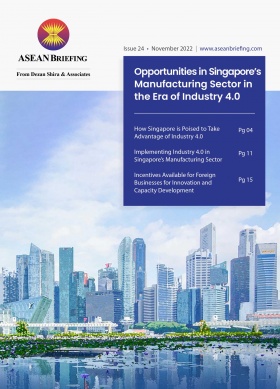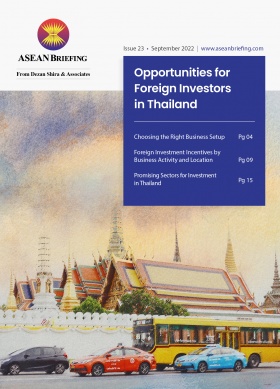UK Joins the CPTPP: Opportunities for British Investors in Malaysia
The UK joining the Comprehensive and Progressive Agreement for Trans-Pacific Partnership (CPTPP) trade bloc presents opportunities for British companies to invest in Malaysia, which is also a signatory to the CPTPP.
These opportunities include the healthcare, education, and advanced manufacturing sectors.
The United Kingdom has joined the 11-member Comprehensive and Progressive Agreement for Trans-Pacific Partnership (CPTPP) trade bloc, after two years of negotiations. The trade pact offers British consumers and businesses access to one of the largest free trade areas by GDP (approx. US$13.5 trillion) and a market of 500 million people.
The UK’s decision to join the CPTPP is anticipated to boost trade with Malaysia, also a CPTPP member. As an example, Malaysia has successfully negotiated with the UK to eliminate tariffs on Malaysian palm oil from the current 12 percent to zero upon entry into the trade pact.
Bilateral trade between Malaysia and the UK reached over US$7.3 billion in 2022, with the UK recording a trade surplus of some US$786 million.
We look at the sectors in Malaysia that could benefit from the new market access as well as the opportunities for British investors in Malaysia.
Palm oil
Under the CPTPP framework, the UK will eliminate tariffs placed on the import of Malaysian palm oil, providing a boost to producers. Malaysia is currently the world’s second-largest palm oil producer after Indonesia, controlling some 25 percent of global palm oil production and exports. For 2023, the Malaysian Palm Oil Board anticipates palm oil exports to increase by 3.7 percent to 16.3 million tons.
Grown only in the tropics, the oil palm tree produces a high-quality oil that is used as a common ingredient in cosmetic and household items, such as detergents, margarine, soaps, chocolates, cakes, cleaning products, and biofuels, among others. It is the most consumed and traded edible oil in the world. Indonesia accounts for 60 percent of the global supply.UK research institutions can also work with Malaysian palm oil producers to improve the sustainability of the industry. Malaysia already has a well-established R&D network for the palm oil industry, utilizing techniques – such as genome mapping, clonal work, and mechanization to improve yields, as well as generating by-products – such as biofuels that add to the palm oil value chain.
Advanced manufacturing
For UK investors, Malaysia presents opportunities as a possible China+1 location, with the Malaysian government remaining focused on developing the local talent pool and embracing Industry 4.0 for the sector. As such, the sector’s priority is to develop more high-value-added, complex, and diverse products, particularly in the catalytic sub-sectors of electrical and electronics (E&E), machinery and equipment, and chemicals. Aerospace and medical devices are also two high-potential growth sub-sectors that the country is pursuing to develop.
Manufacturing plays a vital role in Malaysia’s economy, contributing to 22 percent of GDP annually. E&E products make up Malaysia’s largest exports, accounting for 36 percent of total exports in 2022. This was followed by chemicals, (7 percent), and petroleum products (7 percent).
Healthcare
Malaysia’s healthcare sector offers promising opportunities for British businesses. Malaysia has the potential to become a health service hub in Southeast Asia despite fierce competition from Thailand and Singapore. The country has established itself as a center of affordable specialized medical treatments, such as for cardiology and fertility treatments; there are more than 30 advanced heart treatment centers.
Malaysia is also a major manufacturer of medical devices and an outsourcing destination for many global brands. Opportunities for foreign investors lie in high-value-added medical device production. Currently, 90 percent of medical devices produced are exported, contributing to over 41 billion ringgit (US$9.3 billion).
Further, Malaysia can become the preferred destination for medical tourism in the region. The country attracted over one million medical tourists in 2019, which earned government revenues of more than US$433 million. Although this number decreased due to the COVID-19 pandemic, it is slowly recovering with 800,000 medical tourists arriving in 2022.
The Ministry of Health’s Malaysia Healthcare Travel Council (MHTC) has partnered with 79 hospitals to cater to the demand. Some of these hospitals are accredited by international healthcare agencies, such as Accreditations Canada, Joint Commission International (JCI – USA), and the CHKS Accreditation Unit (UK).
Investors that establish new healthcare facilities or modernize existing facilities for medical tourism are eligible for fiscal and non-fiscal incentives.
Education
Malaysia is recognized as a leading education hub for international students who contribute approximately 5.9 billion ringgit (US$1.3 billion) to the country’s economy annually.
For more than 30 years, foreign universities have been allowed to establish branch campuses in Malaysia. Monash University, Curtin University, Newcastle University, the University of Southampton, and the University of Nottingham, are just a few of the foreign universities to have established a branch campus in the country.This strategy has attracted international students who may not have the financial capacity to study in the UK or Australia, as well as middle-class Malaysians. The majority of international students come from China, Indonesia, Bangladesh, India, and Nigeria, and the country aims to have 250,000 foreign students enrolled by 2025.
Additionally, there are investment opportunities in the establishment of vocational education and training centers.
About Us
ASEAN Briefing is produced by Dezan Shira & Associates. The firm assists foreign investors throughout Asia and maintains offices throughout ASEAN, including in Singapore, Hanoi, Ho Chi Minh City, and Da Nang in Vietnam, in addition to Jakarta, in Indonesia. We also have partner firms in Malaysia, the Philippines, and Thailand as well as our practices in China and India. Please contact us at asean@dezshira.com or visit our website at www.dezshira.com.
- Previous Article How to Set Up a Company in Indonesia
- Next Article An Overview of Indonesia’s Double Tax Avoidance Agreements








